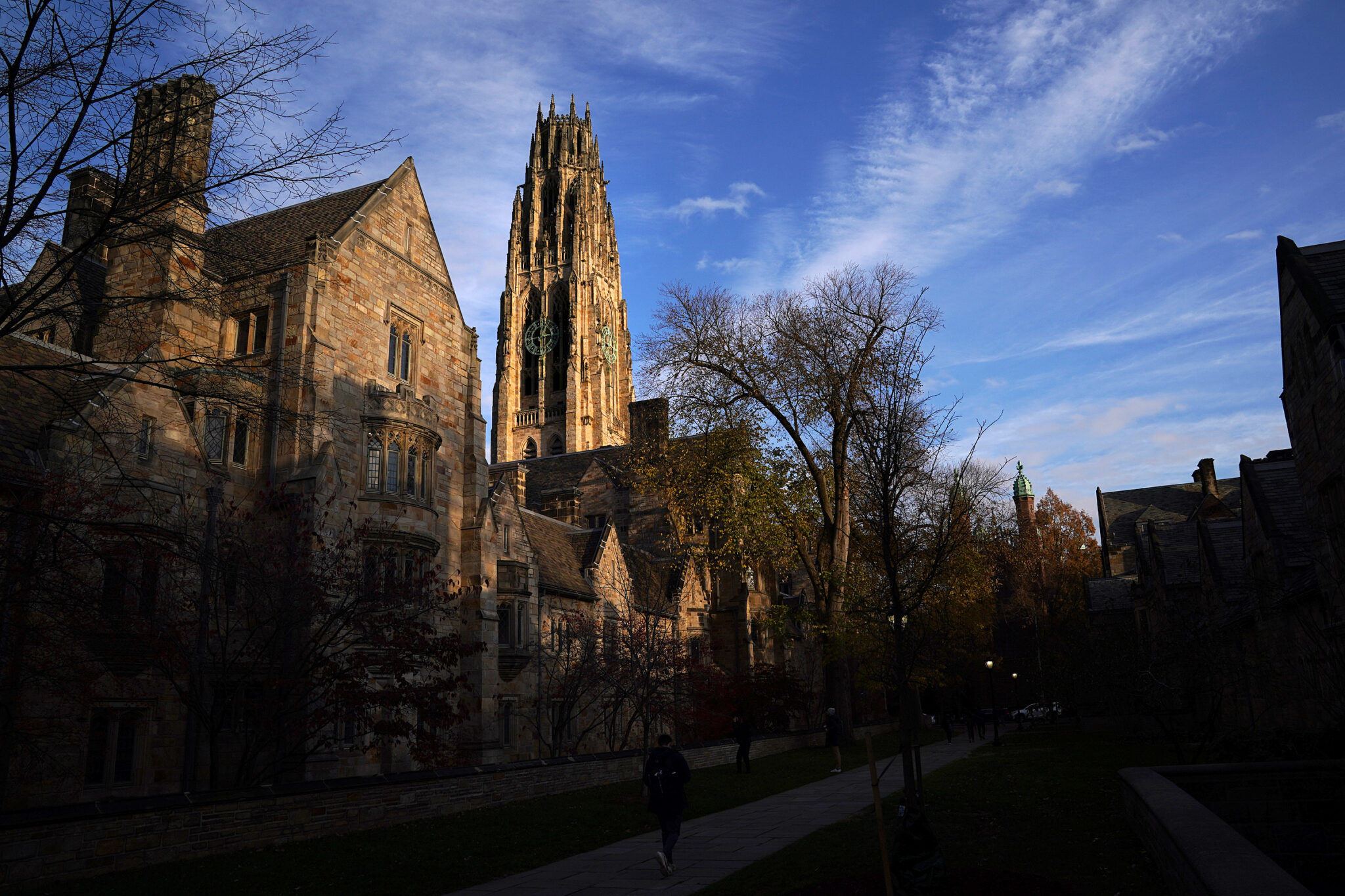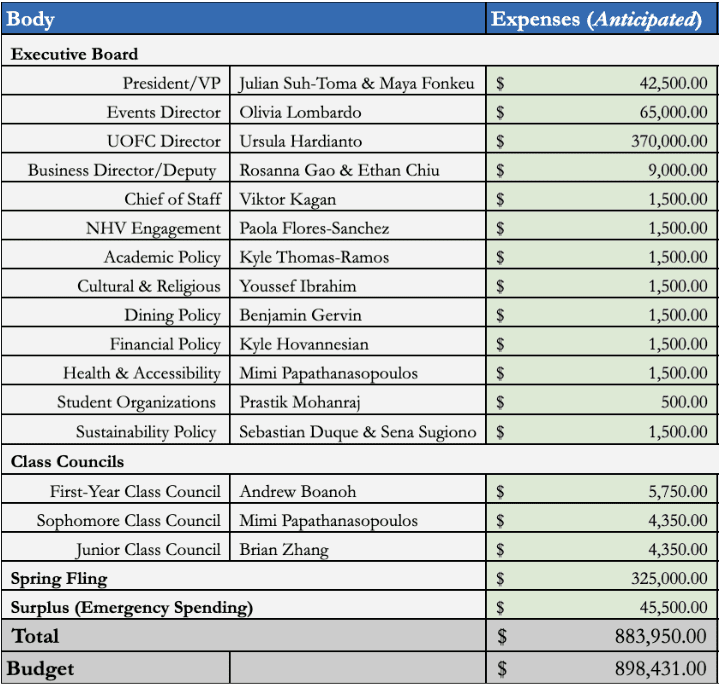After ‘significant accounting discrepancies,’ YCC’s budget unexpectedly falls by over $100,000
The Yale College Council originally anticipated its 2023-24 budget to be $1,000,100; it is now $898,431.

Tim Tai, Senior Photographer
The Yale College Council originally anticipated its 2023-24 budget to be $1,001,000 based on normal University budget distributions and a $100,811.5 surplus from last year’s administration. But unbeknown to YCC leadership during this year’s budget planning stages, the “surplus” was merely an accounting error.
The funds in question, which last year’s YCC president originally claimed constituted an operational surplus, were actually used in emergency spending near the end of the 2022-23 school year. The YCC’s 2023-24 budget has thus decreased by over $100,000.
The YCC receives almost a million dollars in funding each year from the University, most of which comes from student tuition. Over the summer, the incoming YCC leaders set their proposed budget at $1,001,000. By the end of September, after conversations with the University’s Office of Business Operations, the council had to amend its earlier proposed and voted-on budget to $898,431 due to the fictional surplus, which current YCC President Julian Suh-Toma ’25 told the News resulted from “significant accounting discrepancies.”
“This was really, really hard for us,” Suh-Toma said. “We had a lot of excitement from executive board members who had great ideas for projects, but now they were told, ‘you have to cut your budget by a lot,’ which is really disheartening.”
The accounting error will directly reduce the amount of money the YCC can spend this year on student events and senator projects relative to what it originally planned to spend.
Budget breakdown
This primary source of the YCC budget consists of funds from student tuition; before financial aid is calculated, there is a $125 Student Activities Fee included in each student’s tuition. The rest of the budget comes from the YCC’s endowment and any rollover funds from previous years. Last year’s budget under YCC President Leleda Beraki ’24 and Vice President Iris Li ’24 was $910,219.
This year’s anticipated expenses — which were set based on the expected money from both the student tuition, the endowment and the “surplus” from last year’s leadership — were originally set at $1,001,000 by the YCC Senate over the summer, according to records from Senate meeting minutes.
However, this year’s budget fell $102,569 shorter than anticipated and was finalized at $898,431, which will decrease how much YCC can spend this year relative to what it originally planned. This difference became evident after YCC conversations with the Business Operations Office and Yale College Dean’s Office earlier in the semester. The Business Operations Office — which has two employees who manage undergraduate finances, according to its website — told the News that it never received any surplus budget funds from last year’s YCC administration.
Last year’s YCC President Leleda Beraki ’24 and Vice President Iris Li ’24 originally claimed that there was, in fact, a surplus of approximately $100,000 that should have rolled over for this year’s leadership. However, their Business Director Jad Bataha ’24 confirmed with the News that the money was not surplus and was instead used as “emergency spending” at the end of the 2022-2023 school year.

The Yale College Council’s 2023-24 budget breakdown. The spreadsheet is continuously updated to reflect expenditures.
The current budget of $898,431 is divided into both internal and external spending, Vice President Maya Fonkeu ’25 told the News. The external spending, which includes 78.7 percent of the budget, has already distributed $325,000 to the Spring Fling Committee, the group of students responsible for planning the day-long music festival that occurs after classes end each spring.
Another $370,000 has also already been allocated to the Undergraduate Organizations Funding Committee, or UOFC, which funds Yale’s over 500 student clubs and organizations. All of the subsequent allocation of funds to specific clubs is monitored by UOFC Director Ursula Hardianto ’25 and occurs via a UOFC application process sent to all clubs, Fonkeu told the News.
The remaining 21.3 percent of the budget is used on internal expenditures and is overseen by the Yale College Council’s business directors, Rosanna Gao ’26 and Ethan Chiu ’26, per Fonkeu.
Accounting discrepancies
Suh-Toma told the News that the YCC’s overall budget comes from three main sources: student tuition from the student activities fee, the YCC endowment and any surplus from the previous year’s administration.
Disregarding a surplus of funds left over from last year’s budget, this year’s budget should have been approximately $897,750 if calculated from the approximate 6,590 undergraduates’ student activities fees and the YCC’s endowment dividend — which was $74,000, per Gao. This total resembles the actual budget for this year’s administration: $898,431.00.
However, according to last year’s inaccurate budget tracker, which was obtained by the News, the YCC only used $809,407.47 of its $910,219.00 in anticipated expenses. These residual funds should have left $100,811.53 for this year’s group to tack onto its budget, which is why the anticipated budget number hovered just above a million dollars.
 The 2022-23 inaccurate YCC Budget Tracker, courtesy of Leleda Beraki. According to the above spreadsheet, there should have been a $100,811.53 rollover.
The 2022-23 inaccurate YCC Budget Tracker, courtesy of Leleda Beraki. According to the above spreadsheet, there should have been a $100,811.53 rollover.
However, on Sept. 14, after conversations with the Business Operations Office, Suh-Toma said that there was no surplus from last year’s expenses. Suh-Toma added that this year’s YCC administration was told that the spreadsheet they used to determine their initial anticipated expenses was out of date and incorrectly indicated a surplus. Bataha confirmed this with the News.
“To no fault of anybody in the previous administration, but there was a little bit of mis-accounting in the last couple of months [of the 2022-2023 school year],” Suh-Toma said. “We didn’t actually know how much was being spent, and that number is then used to calculate how much surplus we’re getting from prior years. So they used pretty much all of their budget, but we had thought that they had not spent all of it, because spending hadn’t been put in the spreadsheet.”
Paul McKinley, senior associate dean of strategic initiatives and communications, confirmed that the official budget was not set until late September and that while the budget may have increased due to a larger first-year class, and thus more student activities fees, the “carryover funding” was overall lower.
“If you don’t spend money in one year, it stays in the account,” McKinley explained. “And you can then use it for the next year. During COVID, of course, a lot of that [money] built up so the numbers were pretty high, and then last year it went back down, so there was less rollover.”
Hannah Peck, associate dean of student affairs, added that, given the “confusion” surrounding last year’s and this year’s YCC budgets, she invited the group’s leadership to come back and discuss the matter with her and the Business Operations Office. Peck reaffirmed to the News that the Business Operations Office is not withholding any surplus from prior years.
Reimbursements no longer public
The YCC’s expenditures take a variety of different forms. So far, events this year have included the YCC’s Yale-Harvard Pre-Game at Barcelona Wine Bar the Thursday before The Game, while pilot projects — individual projects conducted by senators — have included the Extracurricular Grant, Healthcare Transportation Reimbursement Program and covering expenses for students, such as printing, laundry, bus services and mental health first-aid training, per Gao.
Additionally, senators and the executive board — including the YCC chief of staff, communications director and business directors — can get reimbursed for their individual projects and day-to-day YCC operations. Check-ins for YCC members at local New Haven shops and coffee chats are reimbursed under the chief of staff’s $1,500 budget and the business directors’ $9,000 budget.
According to the reimbursement spreadsheet, reimbursements take place for meetings — both internally with members of the YCC and externally with other members of the Yale community and those looking to get involved with the YCC — at locations around New Haven, including at Donut Crazy, located on York Street, and Loose Leaf Bubble Tea, located on High Street.
When asked about the criteria for YCC reimbursements, Gao pointed to the YCC 2023-2024 Financial Best Practices document, which is intended to “clarify all spending related matters so that the Yale College Council is responsible, accountable, and clear about where its money is being spent.”
“The YCC maintains a meticulous approach to managing and tracking expenditures to ensure responsible and accountable use of its funds,” Gao wrote to the News. “Every receipt related to a purchase is thoroughly checked and logged into a tracker, which is then reviewed by the business team and Maya and Julian.”
Gao additionally noted that all YCC members must follow “meticulous” steps when using YCC funds. These include filling in a budget sheet and determining the necessity of specific items, per Gao.
All reimbursements used to be publicly available on a Google spreadsheet; as of Dec. 3, that sheet is no longer publicly viewable. When asked about the change, Gao noted that it was made private given that there are “personal financial handles” on the document.
The Yale College Council was established in 1972.
Correction, Dec. 12: The list of reimbursements being publicly available is not necessarily a matter of historic practice for the YCC, as a previous version of this article erroneously reported. The piece has been amended accordingly.







